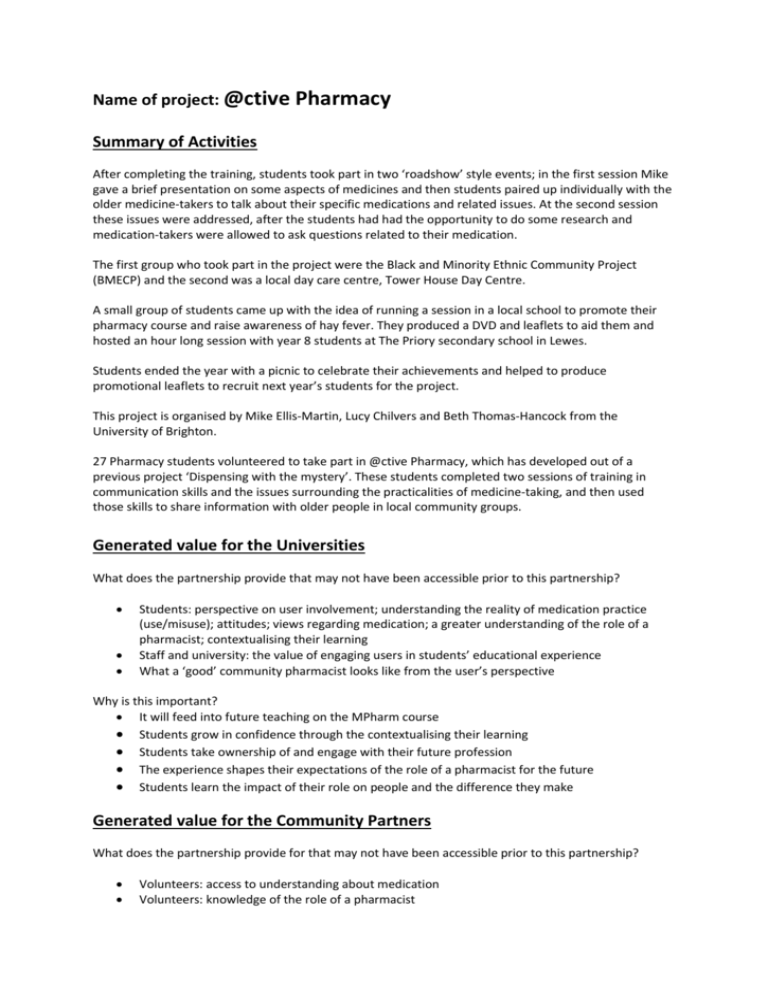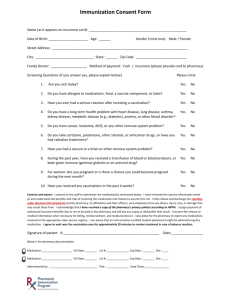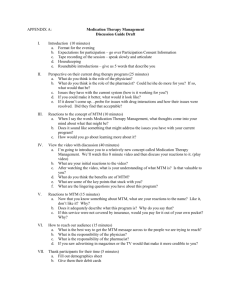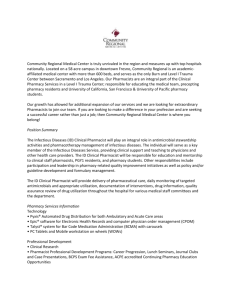Project Outcomes and Participant Feedback
advertisement

Name of project: @ctive Pharmacy Summary of Activities After completing the training, students took part in two ‘roadshow’ style events; in the first session Mike gave a brief presentation on some aspects of medicines and then students paired up individually with the older medicine-takers to talk about their specific medications and related issues. At the second session these issues were addressed, after the students had had the opportunity to do some research and medication-takers were allowed to ask questions related to their medication. The first group who took part in the project were the Black and Minority Ethnic Community Project (BMECP) and the second was a local day care centre, Tower House Day Centre. A small group of students came up with the idea of running a session in a local school to promote their pharmacy course and raise awareness of hay fever. They produced a DVD and leaflets to aid them and hosted an hour long session with year 8 students at The Priory secondary school in Lewes. Students ended the year with a picnic to celebrate their achievements and helped to produce promotional leaflets to recruit next year’s students for the project. This project is organised by Mike Ellis-Martin, Lucy Chilvers and Beth Thomas-Hancock from the University of Brighton. 27 Pharmacy students volunteered to take part in @ctive Pharmacy, which has developed out of a previous project ‘Dispensing with the mystery’. These students completed two sessions of training in communication skills and the issues surrounding the practicalities of medicine-taking, and then used those skills to share information with older people in local community groups. Generated value for the Universities What does the partnership provide that may not have been accessible prior to this partnership? Students: perspective on user involvement; understanding the reality of medication practice (use/misuse); attitudes; views regarding medication; a greater understanding of the role of a pharmacist; contextualising their learning Staff and university: the value of engaging users in students’ educational experience What a ‘good’ community pharmacist looks like from the user’s perspective Why is this important? It will feed into future teaching on the MPharm course Students grow in confidence through the contextualising their learning Students take ownership of and engage with their future profession The experience shapes their expectations of the role of a pharmacist for the future Students learn the impact of their role on people and the difference they make Generated value for the Community Partners What does the partnership provide for that may not have been accessible prior to this partnership? Volunteers: access to understanding about medication Volunteers: knowledge of the role of a pharmacist Volunteers: more confidence in asking questions of health professionals Volunteers: a meaningful, mutually beneficial engagement with the students Volunteers: valuable intergenerational interactions Why is this important? Service user empowerment Promotes intergenerational engagement Increases understanding of pharmacist’s role and interaction with local pharmacists Outcomes What are the achievements and impacts of the project, in social or economic terms? Improvement in the capacity of the universities and third sector organisations to meet the health and wellbeing needs of user-groups A sustainable infrastructure between universities and third sector organisations for community knowledge exchange Exchange of good practice and information on university-community engagement across the South East coastal region Enrichment of teaching and learning practice and the facilitation of new research opportunities and practice within universities Enrichment of interaction and support enabling facilitation of cross-community practice through development of an increased number of partnerships between third sector organisations The enhanced status of community knowledge transfer and exchange in the mission statements and strategic plans of participating universities and third sector partner Leveraging of additional funding, to bring added value to local partnerships These are the project’s outcomes: Medication users are more informed about their own medication issues and choices and are therefore more in control of their health and wellbeing. This can include relationships with their community pharmacist/ GP/ other medical people. Students experience real life application of their studies; this will improve their communication skills and confidence with patients which will improve their OSCE exam performance. This could lead to students being better equipped for their profession. Medication users are empowered through being active participants in pharmacy students’ learning. This makes them more integrated with their community and breaks down the stereotypes of students and young people. Students experience a better value for their money, getting more valuable experience on their course. Students take responsibility for the promotion and running of the project and are able to engage with their profession, not just their course. Evidence Indicators of student learning and understanding about older people/ users of medication: “At the beginning I was really nervous. The lady was really nice and she put me at my ease. It was interesting – a really good experience – I really enjoyed” Sylvie, student “It was really good; I enjoyed talking to them and learning things from them because they’ve been through a lot.” Dolly, student “Active Pharmacy has been great fun and really expanded my knowledge….it is the perfect way to apply what you learn in lectures to real life situations” James, student “I’ve really enjoyed meeting the older people and talking to them about their medication and their lives” Piya, student “I would just like to say, being a part of active pharmacy this year has given me a lot of confidence. That is in terms of approaching people from different backgrounds who I know nothing about and being able to gain their trust and giving them the reassurance that it is OK to talk about their medications and any issues they may have. At the same time I think I've been able to make a lot of friends, learnt from other students’ experiences from their consultations. Also for me personally, it's really hit home the role of a pharmacist and reminded me once again how much one conversation that we have with a patient can really influence their choices and views. At the same time it’s motivated me to work harder, just seeing the smile on some of the older persons faces after a little talk was just priceless really. I'd like to thank you, Mike and everyone else who has made it possible to take part in such a great project this year. I look forward to next year.” Anita, student Indicators of developed community volunteers’ confidence, knowledge and communication skills: “It’s been a new experience being with the students” BMECP community participant “Very interesting and enlightening – this young lady studying pharmacy can answer my questions and the ones she couldn’t she went and researched and came back and told me.” BMECP community participant “I enjoyed meeting the student and talking one to one with them; it was good having a student who listens to me and then comes back with an answer – I feel like doctors don’t listen enough to patients” BMECP community participant “I am very happy to meet young girl – she is very helpful, I learnt a lot of things from her. She told me everything to do for my benefit. So I hope to consult my doctor – I wish my doctor was like her – she was lovely.” BMECP community participant Indicators of the growth and strength of community-university relationships: @ctive Pharmacy and the School of Pharmacy have developed strong connections with the PCT and students now have regular newsletters, invites to attend PCT workshops, events and steering groups “I went for the meeting. It was very good and we got a good mentor on how to deal with different situations of EHC cases when in a pharmacy. It was very good and we got relevant feedback. Myself and Anam did the role plays and it was very encouraging. Thank you. Sandra” “Hope you are well. With regards to the PCT event, it was a great opportunity to learn about the EHC and also to meet other people in the industry. The hostess was very friendly and the information very useful.” Anam Indicators of community organisations involving service users as respected ‘experts’: “All of the students were taking an interest in listening to the service users and had a good awareness of the disabilities some had.” THDC staff “They seemed pretty friendly and good at communicating – having a right good old natter.” THDC staff “I’m impressed how they’ve got interacting with everyone. They’ve all got chatting about relevant issues…they’re opening up.” THDC staff “It was really interesting and beneficial…I really enjoyed talking to the lady and finding out that she trusted me more than her doctor! - She asked me a question that she didn’t want to ask her doctor.” Ibrahim, student “Very interesting and enlightening – this young lady studying pharmacy can answer my questions and the ones she couldn’t she went and researched and came back and told me.” BMECP participant Indicators of a sustainable infrastructure for knowledge exchange such as development of innovative learning resources and expertise: Students developed a leaflet to be used for recruiting students in the next academic year to get involved with the project and will also accompany Mike Ellis-Martin into lectures to tell students about their experience. Due to a lack of funding in the next academic year, Lucy Chilvers will not be formally involved in the project so we have developed a new structure to take the project forward. Mike Ellis Martin will remain giving oversight and direction for the project; Beth Thomas-Hancock will take on a great involvement liaising with community groups and, over the summer, will be arranging a number of roadshow sessions to have in place for the next year of the project. Lucy Chilvers’ position in the school enables her to have a small amount of time to stay involved. On discussion it appeared important the person coordinating the project was approachable for students; Lucy’s student well-being focus and similar age to the students enables effective communication with the students.






